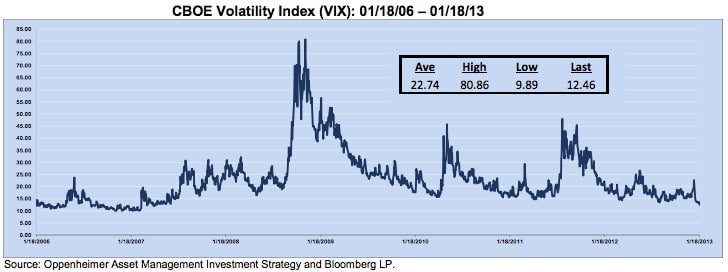Wall Street’s “fear index” is at its least fearful in five years—and that may be a really scary sign
Markets have been riding a wave of optimism so far this year. Unfortunately, we’re about to rain on your parade.

Markets have been riding a wave of optimism so far this year. Unfortunately, we’re about to rain on your parade.
It’s all about looking at Wall Street’s so-called “fear index,” the CBOE Volatility Index, or VIX. It has been trading at record lows of late, falling to a new five-year low on Jan. 18. It reflects the exceptional bullishness we’ve seen in markets lately, propelled by a partial resolution of the US fiscal cliff, dissipating market tensions in Europe, and better-than-expected macroeconomic numbers from China, suggesting fears of its economic slowdown might have been overblown.
However, it turns out that record low volatility might not be a really a good sign, at least on a historical basis. John Stoltzfus, chief market strategist of Oppenheimer Asset Management, warns in a note this morning:
We caution our readers about past periods of deflated volatility; the last time the VIX traded down to a new low, which occurred on 01/24/07, it rallied drastically in the following month. Approximately six weeks later on 03/05/07 the index had increased to 98.48%. By 08/16/07, less than eight months from the low, the VIX index was up 211.73%.
Stoltzfus stops short of cautioning investors against any real systemic problems in the global economy or financial system. In fact, he’s relatively constructive on stocks, particularly in the US. But he’s not the first to argue that optimistic investors might be getting ahead of themselves. TF Market Advisor’s Peter Tchir wrote last week:
This market isn’t even betting on hope, it feels more and more like the market is betting on “boredom”…This feels more and more like 2007 to me. It seemed staggering at the time that the market could rush to new all-time highs based on the Fed turning the “discount window” into an actual lending facility and a rate cut. Sub-prime, banks, etc., were all problems that everyone knew about and could see, yet the single biggest investment philosophy was ‘don’t fight the Fed’ at least for a period of time. The market also bravely fought off the Bear Sterns fiasco on the back of “infinite” liquidity for a period of time. The market’s willingness, if now desire, to believe in the Fed is extreme. It has paid off sometimes, but has been horribly wrong, naïve, and short sighted at other times.
Even if a bona fide financial meltdown isn’t in the works, it’s important to note that some market players are jittery. How much optimism can the market really take?